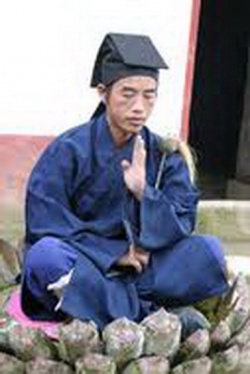ཁྱབ་འཇུག་གི་མིན་སྟེ་འདོམ་ན་ནག་པོ་
(Redirected from कृष्णः)
Jump to navigation
Jump to search
ཁྱབ་འཇུག་གི་མིན་སྟེ་འདོམ་ན་ནག་པོ། (Wyl. khyab 'jug gi min ste 'dom na nag po ) Pron.: khyabjuk gi min té dom na nakpo
- Skt. कृष्णः, kṛṣṇa, Pron.: krishna. From Sanskrit: black, dark, dark-blue | opposed to | and | wicked, evil | with or without | the dark half of the lunar month from full to new moon | the fourth or Kali-yuga | black (the colour) or dark-blue (which is often confounded with black by the Hindūs) | the antelope | a kind of animal feeding on carrion | the Indian cuckoo or Kokila | a crow | Carissa Carandas | N. of one of the poets of the | N. of a celebrated Avatār of the god Vishṇu, or sometimes identified with Vishṇu himself | in the earlier legends he appears as a great hero and teacher | in the more recent he is deified, and is often represented as a young and amorous shepherd with flowing hair and a flute in his hand | the following are a few particulars of his birth and history as related in | and in the Purāṇas: Vasu-deva, who was a descendant of Yadu and Yayāti, had two wives, Rohiṇī and Devakī | the latter had eight sons of whom the eighth was Kṛishṇa | Kan6sa, king of Mathurā and cousin of Devakī, was informed by a prediction that one of these sons would kill him | he therefore kept Vasu-deva and his wife in confinement, and slew their first six children | the seventh was Balarāma who was saved by being abstracted from the womb of Devakī and transferred to that of Rohiṇī | the eighth was Kṛishṇa who was born with black skin and a peculiar mark on his breast | his father Vasu-deva managed to escape from Mathurā with the child, and favoured by the gods found a herdsman named Nanda whose wife Yaśo-dā had just been delivered of a son which Vasu-deva conveyed to Devakī after substituting his own in its place. Nanda with his wife Yaśo-dā took the infant Kṛishṇa and settled first in Gokula or Vraja, and afterwards in Vṛindāvana, where Kṛishṇa and Bala-rāma grew up together, roaming in the woods and joining in the sports of the herdsmen's sons | Kṛishṇa as a youth contested the sovereignty of Indra, and was victorious over that god, who descended from heaven to praise Kṛishṇa, and made him lord over the cattle | Kṛishṇa is described as sporting constantly with the Gopīs or shepherdesses | of whom a thousand became his wives, though only eight are specified, Rādhā being the favourite | Kṛishṇa built and fortified a city called Dvārakā in Gujarāt, and thither transported the inhabitants of Mathurā after killing Kan6sa | Kṛishṇa had various wives besides the Gopīs, and by Rukmiṇī had a son Pradyumna who is usually identified with Kāma-deva | with Jains, Kṛishṇa is one of the nine black Vasu-devas | with Buddhists he is the chief of the black demons, who are the renowned of the Pāṇḍu princes, so named apparently from his colour as a child) | of Vyāsa | of Hārita | of a son of Śuka by Pīvarī (teacher of the Yoga) | of a pupil of Bharad-vāja | of Havir-dhāna | of a son of Arjuna | of an adopted son of A-samañjas, 2039 | of a chief of the Andhras | of the author of a | on the | of a poet | of the author of a | on the Dayā-bhāga | of the son of Keśavārka and grandson of Jayāditya | of the father of Tāna-bhaṭṭa and uncle of Rañga-nātha | of the father of Dāmo7dara and uncle of Malhaṇa | of the father of Prabhūjīka and uncle of Vidyā-dhara | of the father of Madana | of the grammarian Rāma-candra | of the son of Vāruṇe7ndra and father of Lakshmaṇa | of the father of Hīra-bhaṭṭa (author of the | called Carakabhāshya, and of the work Sāhitya-sudhā-samudra | N. of a hell
